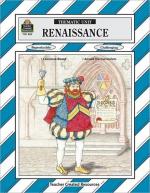|
This section contains 3,159 words (approx. 11 pages at 300 words per page) |

|
Holy Roman Empire. In the Middle Ages the accepted form of government was the monarchy, in which one man had absolute authority, and the ideal was the universal empire, in which all the peoples of the world were subject to one emperor. The Holy Roman emperors claimed authority over all Christendom, but by 1350 the empire was called the Holy Roman Empire of the German Nation, indicating that it largely consisted of Germany. There were about three hundred territorial divisions that controlled their own local affairs. The emperor was elected by seven major lords of the empire. In 1438 Albert V, Duke of Austria, was elected, and the title stayed in the Habsburg family for the duration of the empire.
Ottoman Empire. The Turkish Ottoman Empire also claimed universal authority, although its mandate came from Islam. Osman I, its founder, had built a powerful state in Asia Minor by his...
|
This section contains 3,159 words (approx. 11 pages at 300 words per page) |

|



